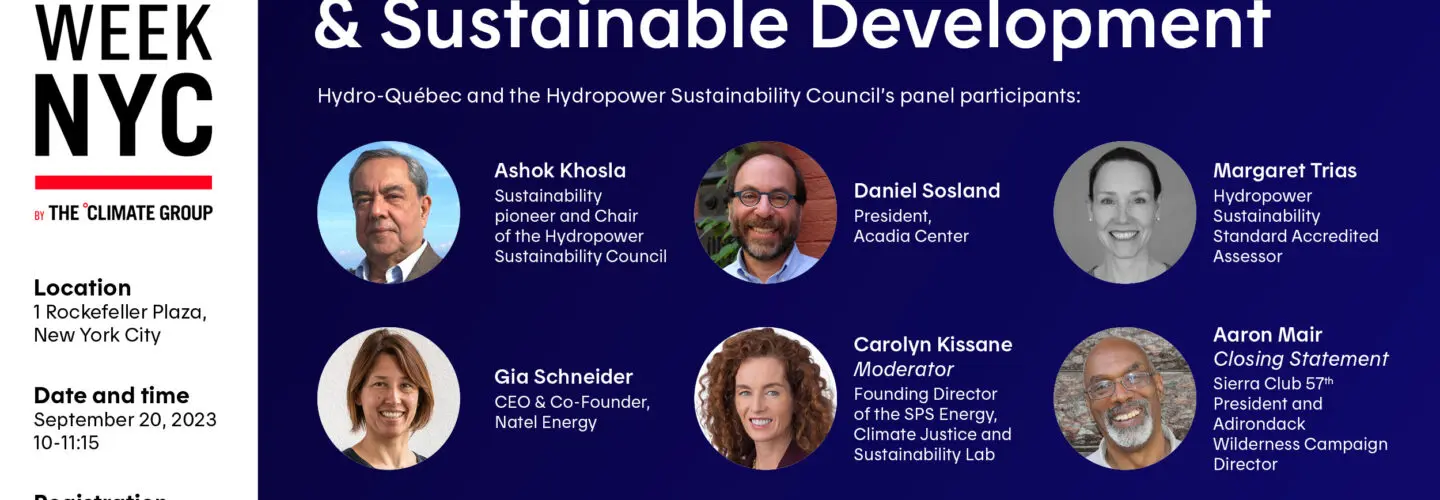Hydropower and Sustainable Development at Climate Week NYC
What is Climate Week NYC?
Climate Week NYC is the largest annual climate event of its kind, bringing together some 400 events and activities across the City of New York – in person, hybrid and online. Each year, business leaders, political change makers, local decision takers and civil society representatives of all ages and backgrounds, from all over the world, gather to drive the transition, speed up progress, and champion change that is already happening.
What event did Acadia Center specifically take part in?
Acadia Center president Dan Sosland was invited to join a panel of experts to discuss large-scale hydropower operations, climate, and sustainability issues. The International Hydropower Association (IHA) has developed a Hydropower Sustainability Standard (HSS) intended to provide an objective set of criteria to assess the operations of existing hydropower facilities. The HSS covers 11 major areas of hydropower operations, including ecosystem and community impacts.
The HSS was developed by NGOs, including the World Wildlife Federation, the Hydropower Sustainability Council, an independent NGO, and government and industry participants. Certification of a project indicates that it meets minimum sustainability expectations across a comprehensive range of topics using up-to-date and sector-specific sustainability guidance.
Hydro-Québec chose to become the first North American hydropower generator to seek certification, a process that began in May 2022 with the audit of its facilities at the Eastmain-1 Development.
In addition to Dan, panelists included prominent international environmental leader Ashok Khosla with the Hydropower Sustainability Council, who is credited with coining the concept of international sustainability, Gia Schneider, founder of Natel Energy, who works on innovation approaches to fisheries protection, and Margaret Trias, an international consultant expert in certification who was one of three independent assessors of the Eastmain-1 project. The panel was moderated by Carolyn Kissane, clinical professor at NYU and Director of the NYU SPS Energy, Climate Justice, and Sustainability (ECJS) Lab. Final words were provided by Aaron Mair, of the Adirondack Council, a leading environmental justice advocate in New York.
Why did Acadia Center specifically involve itself with this topic?
Acadia Center’s mission includes addressing climate and clean energy issues across the region of the northeast U.S. and eastern Canada. Cross-border interactions between these states and provinces occur in many ways. By taking an extensive view of the region, Acadia Center looks for opportunities to advance and assess climate solutions that cross borders when they provide climate, consumer and environmental benefits. Acadia Center’s Dan Sosland has been involved in numerous regulatory issues surrounding hydropower and watershed impacts and protection. Acadia Center has been directly involved in issues surrounding the role of Canadian hydro as a decarbonization pathway. Acadia Center is currently working with Canadian partners on a project called the Northeast Grid Planning Forum to encourage dialogue to explore the benefits on both sides of the border of greater cooperation between U.S. and Canadian power grids to meet climate, cost, reliability and clean energy goals.
What role will hydropower play in the future of clean energy and sustainable development?
Large-scale hydropower offers both benefits and impacts. The hydropower system in Quebec is extensive and provides low-cost electricity in Quebec and to U.S. states and cities. Reputable independent academic studies have concluded that the existing hydropower system in Quebec generates electricity at very low emission levels, approaching that of solar energy. However, large-scale hydropower can also have significant impacts on watersheds, cultural issues, and indigenous populations.
This event had some prominent panelists. What did you learn from them?
A key takeaway is that the Hydropower Sustainability Standard can significantly influence how a hydropower developer like Hydro-Quebec manages its system. As Joao Costa with the International Hydropower Association explained in a detailed presentation, like other certification approaches such as the U.S. EPA’s EnergyStar and the Sustainable Forestry Initiative, hydro operations can be significantly and positively improved by evaluating against objective, best practices criteria.
What are the high-end takeaways from this event?
Hydropower currently plays a large role around the world as a low-cost and low-emission energy resource. The Hydropower Sustainability Standard can have a positive impact on hydropower operations, including ecological and cultural concerns. Future new developments, however, will depend upon whether a proposed project assesses the full scope of impacts and whether it has the support of local populations. Changes in operations and approaches are happening. For example, in the multi-billion Champlain Hudson Power Express transmission line project connecting Hydro-Quebec to New York City, the portion of the new transmission line in Canada will be jointly owned by the Mohawk community and Hydro-Quebec.




















Follow us